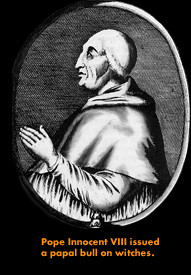 The
death of Sixtus IV was the signal for a general outbreak against
his pushful and greedy relatives. Once more Orsini and Colonna
stood to arms while Caterina Sforza, the redoubtable wife of
Girolamo Riario, the late Pope's favorite lay nephew, seized the
Castle of St. Angelo. It looked as if blood would wash Roman
gutters, but cooler heads prevailed, and the cardinals were able
to proceed to an election.
The
death of Sixtus IV was the signal for a general outbreak against
his pushful and greedy relatives. Once more Orsini and Colonna
stood to arms while Caterina Sforza, the redoubtable wife of
Girolamo Riario, the late Pope's favorite lay nephew, seized the
Castle of St. Angelo. It looked as if blood would wash Roman
gutters, but cooler heads prevailed, and the cardinals were able
to proceed to an election.
The conclave, like Rome itself, was torn by factions. The
chief rivals were Giuliano della Rovere, the most able of the
late Pope's nephews, and Rodrigo Borgia, the nephew of Calixtus
III. Bargaining seems to have been quite open, and the election
was decided when Della Rovere and Borgia got together on a
compromise candidate, a weak, good-natured man whom the
ambitious cardinals hoped to dominate, Giovanni Battista Cibo.
Giovanni Battista Cibo was born in Genoa in 1432, the son of
a Roman senator. As a young man he was somewhat licentious and
had two illegitimate children, Franceschetto and Teodorina. But
after young Cibo took orders he settled down. He became bishop
of Savona in 1467, and in 1473 exchanged Savona for the see of
Olfetta in Naples. He was created cardinal in 1473 by Sixtus IV.
He chose the name of Innocent VIII.
The first part of his reign was dominated by Cardinal
Giuliano della Rovere, that most able and energetic of Sixtus
IV's nephews, but the easy- going Innocent soon tired of power
politics and allowed Lorenzo de' Medici to guide his policy
during the latter part of his pontificate. He made Lorenzo's
teen-age nephew a cardinal, but stipulated that he should not
assume the robes and obligations of the cardinalate until he was
eighteen.
Innocent summoned a congress to meet at Rome in 1490 to
discuss a crusade against the Turks. Interest in the proposal
was heightened by the presence of the Sultan's brother, Prince
Jem, in Rome. But as usual, nothing came of the congress.
Although Pope Innocent meant well, he contributed to the
decline of papal prestige by his open acknowledgment of his
illegitimate children in the Vatican. His son Franceschetto, who
was living a dissolute life, was no help to the Pope.
Then too, Innocent was very hard pressed for funds. To get
them he increased the number of purchasable offices. This in
turn caused graft and corruption among officials. Innocent had
the bitter experience of seeing forged bulls sold under his very
eyes. When the culprits were discovered, death was their
portion, but great damage was done before the forgeries were
discovered.
Innocent had the consolation of hearing of the fall of
Granada to the arms of Ferdinand and Isabella. But his
pontificate, on the whole, did little for the Church. He himself
seemed to realize this, and on his deathbed he asked the
cardinals' forgiveness for having done so little and begged them
to elect a better successor. How they answered this appeal is a
matter of history.
Innocent VIII died devoutly on July 25, 1492.
Excerpted from "Popes
Through the Ages" by Joseph Brusher, S.J.

